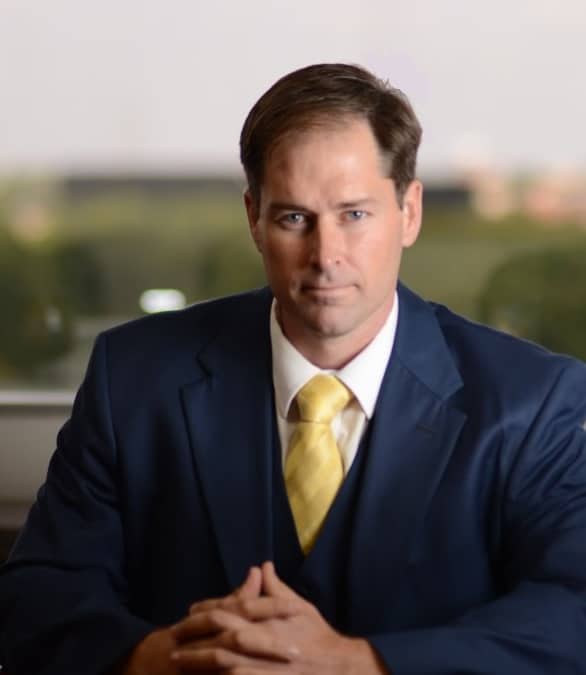The Woodlands | Katy | Houston | College Station
Navigating Financial Challenges: A Comprehensive Guide to Chapter 7 Bankruptcy Click to callSchedule a Free ConsultFree Case Evaluation
(936) 262-7474
Nicholas A. Davis, Attorney
Serving Montgomery, Harris, Fort Bend, Brazos, Grimes, Waller, Walker & Surrounding Counties
Why Chapter 7 Bankruptcy May Be Your Fresh Start in The Woodlands, Houston, Katy, & College Station, TX?
When you’re facing mounting debt that feels insurmountable, it can be easy to feel trapped. You may have tried everything – cutting back on spending, working extra hours, or taking on new loans to keep creditors at bay – but still find yourself struggling. If this sounds familiar, there may be a way out: Chapter 7 Bankruptcy.
This guide will walk you through what Chapter 7 bankruptcy is, how it works, and why it might be the fresh start you need. As trusted bankruptcy attorneys in The Woodlands, Houston, Katy, and College Station, we know that taking the first step toward bankruptcy can be daunting. But rest assured, acting swiftly can help put you on the path toward a brighter, debt-free future.
Don’t wait until it’s too late to act. Contact Nick Davis Law Bankruptcy Relief Lawyers today for a free consultation at (936) 262-7474 and assistance in filing for Bankruptcy in The Woodlands, Houston, Katy, and College Station.
What is Chapter 7 Bankruptcy and How Does it Work?
Understanding the Basics of Chapter 7 Bankruptcy
Chapter 7 bankruptcy is often referred to as a “liquidation bankruptcy.” What does that mean? In essence, Chapter 7 allows individuals to discharge most of their unsecured debts—debts that are not tied to specific property—such as credit card bills, medical bills, and personal loans.
This process works by having a bankruptcy trustee oversee the sale (or liquidation) of certain non-exempt assets to pay off creditors. After this process, the remaining debts are wiped out, providing you with a fresh financial start.
How It Works
- Filing the Petition: You initiate the process by filing a bankruptcy petition with the court. This petition includes detailed information about your income, expenses, debts, and assets.
- Appointment of Trustee: The court appoints a trustee to manage the bankruptcy. The trustee’s job is to evaluate your assets and determine if they can be sold to pay creditors.
- 341 Meeting of Creditors: You’ll attend a meeting with the trustee and creditors. The trustee will ask questions to verify your financial situation. Creditors may or may not attend.
- Debt Discharge: Once the liquidation process is complete, the court will discharge your eligible debts, relieving you of most of your financial burdens.
Is Your Debt Out of Control?
Is Chapter 7 Bankruptcy Right for You? Key Questions to Consider
Chapter 7 might be the right choice if you’re overwhelmed by debt that you simply can’t repay in a reasonable amount of time. Whether it’s credit card debt or medical bills, Chapter 7 bankruptcy can provide a way to eliminate those obligations and relieve you from constant creditor calls and harassing collection efforts.
Do You Qualify for Chapter 7?
One of the key considerations for Chapter 7 is eligibility. Not everyone can file for Chapter 7 bankruptcy. A means test is used to determine if your income is below the median income for your state. If your income is too high, you may need to file for Chapter 13 Bankruptcy instead.
Are You Willing to Liquidate Non-Exempt Assets?
In Chapter 7, your non-exempt assets—items like second homes, valuable jewelry, or expensive collectibles—could be sold to pay your creditors. The good news is that Texas has generous exemptions, so many people can file for Chapter 7 without losing significant property.
Fast Relief from Debt in Montgomery, Fort Bend, Harris, Brazos and Surrounding Counties
The Benefits of Chapter 7 Bankruptcy
One of the major advantages of Chapter 7 is how quickly it works. In most cases, you’ll receive a debt discharge within three to six months. This fast relief allows you to move on with your life and start rebuilding your finances.
Discharge of Unsecured Debts
Chapter 7 can wipe out most types of unsecured debt, like credit card debt, medical bills, and personal loans. This is often a game-changer for individuals and families who are struggling to keep up with payments.
Protecting Your Home and Car
In Texas, there are strong homestead exemptions that protect your primary residence, and exemptions that can protect your vehicle as well. This means that, in many cases, you can keep your home and car while discharging your other debts.
Impact on Your Credit Score
Potential Drawbacks and Considerations of Chapter 7 Bankruptcy
While Chapter 7 provides immediate relief, it does have an impact on your credit. Bankruptcy stays on your credit report for up to 10 years. However, many people find that their credit scores actually improve after bankruptcy because they’re no longer weighed down by significant debt.
Loss of Non-Exempt Property
If you have non-exempt assets—like a second car or valuable collectibles—these could be sold to pay creditors. However, Texas exemptions are relatively generous, and many people are able to keep their most important assets.
Bankruptcy May Not Cover All Debts
Chapter 7 bankruptcy will not discharge all types of debt. For example, student loans, child support, and alimony are generally not dischargeable under Chapter 7. It’s important to understand what will and won’t be wiped out by bankruptcy.
Getting the Chapter 7 Bankruptcy Started in Montgomery, Fort Bend, Harris, Brazos and Surrounding Counties
The Chapter 7 Bankruptcy Process – What to Expect
Step 1: Filing the Petition
The process begins by filing a bankruptcy petition with the court. This petition includes all your financial details, including income, assets, debts, and creditors. Once the petition is filed, an automatic stay goes into effect, stopping most collection activities.
Step 2: Trustee Appointment and Asset Liquidation
Once your case is filed, the court will assign a trustee to review your assets and liabilities. The trustee will determine whether any of your non-exempt assets need to be sold to satisfy your creditors.
Step 3: The 341 Meeting of Creditors
In this meeting, the trustee will ask you questions about your finances. Creditors can attend, but they rarely do. After this meeting, your debts will begin to be discharged, and your assets liquidated (if applicable).
Our Chapter 7 Bankruptcy Lawyers Can Prepare You for Success
How to Prepare for Chapter 7 Bankruptcy
Gathering Your Financial Documents
Preparation is key. To file for Chapter 7, you’ll need to gather several important documents, such as:
- Tax returns
- Bank statements
- Pay stubs
- Debt records (credit card bills, medical bills, etc.)
Working with an Experienced Bankruptcy Attorney
Navigating bankruptcy is complex, and an experienced bankruptcy lawyer can help guide you through the process. They will ensure that your case is filed properly and that you understand your rights and obligations.
Understanding Your Exemptions
Texas has generous bankruptcy exemptions, and an experienced bankruptcy attorney will help you maximize them to ensure you retain as many assets as possible.
What is Next in Montgomery, Fort Bend, Harris, Brazos and Surrounding Counties
Life After Chapter 7 Bankruptcy
Step 1: Filing the Petition
The process begins by filing a bankruptcy petition with the court. This petition includes all your financial details, including income, assets, debts, and creditors. Once the petition is filed, an automatic stay goes into effect, stopping most collection activities.
Step 2: Trustee Appointment and Asset Liquidation
Once your case is filed, the court will assign a trustee to review your assets and liabilities. The trustee will determine whether any of your non-exempt assets need to be sold to satisfy your creditors.
Step 3: The 341 Meeting of Creditors
In this meeting, the trustee will ask you questions about your finances. Creditors can attend, but they rarely do. After this meeting, your debts will begin to be discharged, and your assets liquidated (if applicable).
Delaying Could Make Things Worse
Why Acting Now is Critical
If you’ve been putting off filing for bankruptcy, you could be letting your financial problems get worse. Property Seizures, Bank Levies, foreclosure, and even legal action from creditors are all consequences of waiting too long to seek relief.
The sooner you file, the sooner you can begin your journey to financial freedom. Contact our dedicated bankruptcy lawyers in The Woodlands, Houston, Katy, or College Station for a free consultation.
Take Control of Your Financial Future Today
Are you ready to start fresh? Let our trusted bankruptcy attorneys help guide you through the process. We’ve helped countless individuals in The Woodlands, Houston, Katy, and College Station overcome financial challenges and find peace of mind.
Call us now to schedule a consultation and learn how Chapter 7 Bankruptcy can help you take control of your financial future!
FAQ
Frequently Asked Questions
What is the difference between Chapter 7 and Chapter 11?
Chapter 7 is a liquidation bankruptcy primarily for individuals looking to discharge unsecured debts, while Chapter 11 is a reorganization bankruptcy, usually for businesses or high-income individuals, allowing them to restructure debt and retain assets.
Can bankruptcy stop creditor harassment?
Yes. Once you file for bankruptcy, an automatic stay immediately halts all collection efforts, including phone calls, lawsuits, and wage garnishments.
How long does the bankruptcy process take?
Chapter 7 cases typically take 3 to 6 months, while Chapter 11 cases can last several months to a few years depending on the complexity of the restructuring.
Can bankruptcy help with my tax debts?
Some tax debts can be discharged, but it depends on specific factors. We will analyze your situation in detail to determine how bankruptcy can best help you with tax obligations.
Will I lose my home or car in bankruptcy?
In most cases, Texas law protects homes through the homestead exemption and personal property like cars under state exemptions, allowing you to retain them.
Will filing for bankruptcy ruin my credit forever?
No, filing for bankruptcy will impact your credit score, but it won’t ruin your credit forever. Most individuals who file for bankruptcy start rebuilding their credit within a year of receiving a discharge. Nick Davis Law can guide you through post-bankruptcy financial management strategies to help you recover and improve your credit over time.
Do I have to go to court when I file for bankruptcy?
In most bankruptcy cases, you’ll be required to attend a meeting of creditors (341 meeting), where the bankruptcy trustee will ask questions about your financial situation. However, this is not a courtroom hearing and now is primarily conducted only by Zoom. For Chapter 11 cases, court appearances may be necessary for plan confirmations or hearings. Nick Davis Law will prepare and represent you at every step to ensure you’re fully informed and protected.
Can I include all of my debts in a bankruptcy filing?
Not all debts are eligible for discharge in bankruptcy. While unsecured debts like credit card balances and medical bills are typically dischargeable, other debts—such as student loans, child support, alimony, and certain tax debts—may not be. We will thoroughly review your debt portfolio to help you understand which debts can be discharged.
Can I keep my business open if I file for Chapter 11 bankruptcy?
Yes, in Chapter 11 bankruptcy, many businesses are able to remain operational while they reorganize their debts. Chapter 11 allows you to create a plan to restructure and pay down debts without closing your business. We help you navigate the complexities of Chapter 11 to ensure your business can survive and emerge stronger.
How much does it cost to file for bankruptcy?
The cost of filing for bankruptcy includes court filing fees and attorney fees, which vary depending on the complexity of your case. Chapter 7 cases generally costs significantly less and at our office is offered for flat fees due to their quicker resolution, while Chapter 11 cases tend to be more expensive, with hourly charges, due to their extended duration and complexity. At Nick Davis Law, we provide transparent pricing and work with you to create an affordable payment plan based on your needs.
OVERVIEW OF CHAPTER 7
COMMON QUESTIONS
CREDIT COUNSELING
341 MEETING
BENEFITS OF CHAPTER 7 BANKRUPTCY
CHAPTER 7 VS. CHAPTER 13
MEANS TEST & ELIGIBILITY FOR CHAPTER 7
FILING FOR CHAPTER 7 IN TEXAS
DEBTS DISCHARGED IN CHAPTER 7
PROTECTING ASSETS
TEXAS EXEMPTIONS
TEXAS SPECIFIC BANKRUPTCY
ROLE OF TRUSTEE
EMERGENCY BANKRUPTCY
IMPACT OF CHAPTER 7
LIFE AFTER CHAPTER 7
BANKRUPTCY LITIGATION
ADDITIONAL BANKRUPTCY AREAS
ALTERNATIVES TO BANKRUPTCY
CHAPTER 11 BANKRUPTCY
OVERVIEW OF CHAPTER 11
FILING FOR CHAPTER 11 BANKRUPTCY
CHAPTER 11 FOR BUSINESSES
CHAPTER 11 FOR INDIVIDUALS
DEVELOPING A CHAPTER 11 REORGANIZATION PLAN
DEALING WITH CREDITORS IN CHAPTER 11
MANAGING ASSETS AND OPERATIONS DURING CHAPTER 11
BANKRUPTCY LITIGATION
ADDITIONAL BANKRUPTCY PRACTICE AREAS
EXITING CHAPTER 11 BANKRUPTCY
ALTERNATIVES TO BANKRUPTCY
SPECIAL CHAPTER 11 TOPICS
From the Blog
Recent Articles
Take Control of Your Financial Future Today
FLEXIBLE APPOINTMENTS | PAYMENT PLANS
At Nick Davis Law, we understand that bankruptcy is a complex and emotional process. Whether you’re an individual facing overwhelming personal debt or a business looking to restructure, we’re determined to guide you through every step. Bankruptcy is not the end—it’s the beginning of a new, more secure financial future.
Get a Free Consultation Now
Contact Nick Davis Law, serving The Woodlands, Katy, Houston, College Station and surrounding cities and counties. Take control of your financial future today—call us at (936) 262-7474. Our Montgomery, Harris, Fort Bend, Walker, Brazos, Grimes, Waller County Bankruptcy Lawyers regularly offer After-Hour & Weekend Phone and Virtual Consults and Payment Plans.
Contact us
Nick Davis Law
26418 Oak Ridge Dr.
The Woodlands, TX 77380
(936) 262-7474
The Woodlands, Texas
26418 Oak Ridge Dr.
The Woodlands, TX 77380
(936) 262-7474
Appointments Only
Bryan | College Station, Texas
750 William D. Fitch Pkwy, Ste 210
College Station, TX 778455
(979) 417-2220
Business Hours
Mon - Fri 8:00 am to 6:00 pm
Our Mission
The Trusted Family, Divorce, Bankruptcy, CPS, and Small Business Lawyers at Nick Davis Law are dedicated to providing the best and most efficient representation possible to our clients to achieve their goals quickly and cost effectively. Nick Davis Law maintain offices in The Woodlands, Katy, Texas and Bryan | College Station and serve all of Montgomery County, Brazos County, Walker County, Waller County, Grimes County, Washington County, Burleson County, San Jacinto County, Liberty County, Harris County, and surrounding counties.



